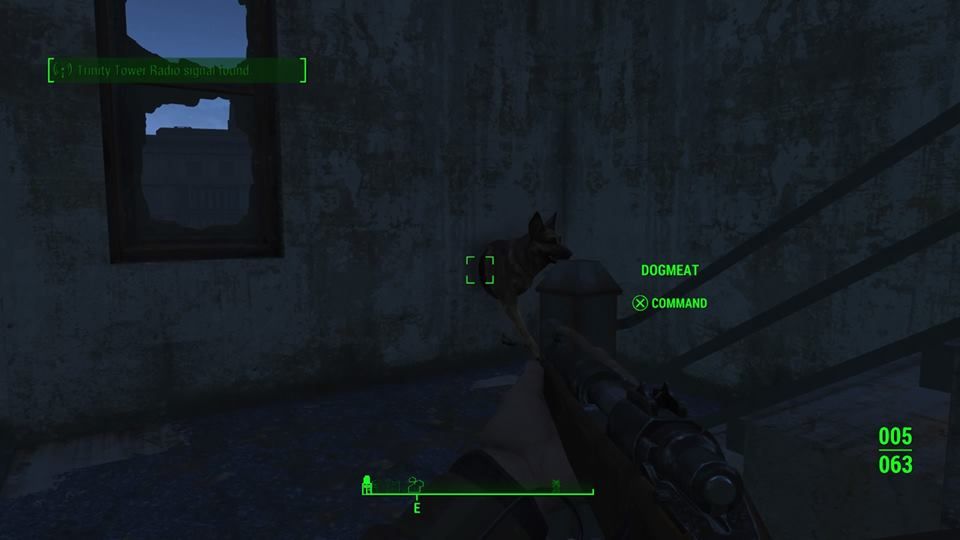War slightly changes in ‘Fallout 4’

Title:
Fallout 4
Release date:
Nov. 10, 2015
Genre:
Open-world action survival
Developer:
Bethesda Game Studios
Publisher:
Bethesda Softworks
Platform reviewed on:
Playstation 4 (
$59.99
)
Also available on:
Xbox One
,
PC
This game is rated “M” for Mature audiences (17 and up) by the Electronic Software Ratings Board.
Tech Deck Fallout 4 Review from The Spokesman-Review on Vimeo .
In the world of blockbuster gaming, much like the world of blockbuster film, it can be irresistible to stray from a winning formula once it’s discovered.
See, for example, the running success of the Madden, Assassin’s Creed and Call of Duty franchises. Gamers across the industry landscape heap criticism on these titles year-after-year for failing to innovate from their previous entries. The small tweaks to a graphical engine, or slight changes to secondary features, are criticized for not going far enough to push the franchise in a new direction.
Fallout 4 comes seven years after the last numbered entry in the series, so it would be logical to expect Bethesda to do some major things to shake up the formula that endeared the franchise to a multitude of new fans when it hit 3D. Those expecting a major overhaul of the game’s mechanics or a complete solution to the game-breaking bugs that have plagued Fallout in the past will be disappointed. Those who come into the experience expecting a deeper, more functional shooter, some interesting new base-building mechanics and a story that retreads familiar ground for the series will be satisfied.

Fallout 4 takes the interesting tact of showing you the franchise’s world before the bombs drop. For the uninitiated, Fallout games are set after a nuclear war between the United States and China has reached its climax. This alternate universe has a very 1950s, sci-fi paranoia feel to it, with things like cola bottles, cigarettes and handy servant robots aplenty. Fallout 4 takes you to the areas surrounding Boston, and your character is one of the famed “Vault Dwellers.” An experience shortly after the bombs fall plays out in front of you in inspired fashion, and once again you have a very personal task when you reach the surface of irradiated Massachusetts.
You’ll quickly become sidetracked, as in every Fallout game, with seemingly endless sidequests and areas to explore. In my first 30 hours in the wasteland, I’ve seen a flooded mansion inhabited by sea creatures, a car factory overrun by ruthless wasteland raiders and Fenway Park converted to a survival settlement. Fallout 4 adds the existence of a new type of enemy, called “Synths,” who serve a shadowy organization called the Institute that has something to do with your personal quest.
The biggest additions to this series are the new crafting mechanics, base building and power armor care. Every item you find in the wasteland can now be scrapped for parts like ceramics and steel, which can be used to build new stocks, scopes and muzzles for your acquired weapons. Gunplay is much more satisfying in this installment than the last, and the changes to the VATS system (which slows time, rather than freezes, enemies, allowing you to pick body parts for targeting with weapons) make playing the game as a traditional shooter a more viable option.

Resources can also be used to construct defense structures, buildings and power generators at different settlements you’ll come across in the world. Early on, you’re recruited by a member of the Minutemen, a group of dedicated soldiers who swore to protect Boston from raiders and irradiated mutants. They failed in that quest, and it’s up to you to rebuild the Minutemen’s presence. You’ll do so by clearing an area of enemies, building structures and defenses to re-establish a settlement then recruiting people to work in these areas. It’s a fun mechanic that is completely optional, but gives the various settlements you encounter on your searches more character and begs ownership from your part in preserving some semblance of society in a destroyed world.
Finally, Bethesda has changed the way the franchise’s popular power armor works. You’ll receive a full set early on, and you’re tasked with finding a new consumable called “fusion cores” to power the suit. The game gives the impression these items are hard to find, but several hours in I have more than a dozen and have few qualms about putting on my power suit to search an area I know will be full of enemies. Power armor is just as customizable as other pieces of armaments you pick up around Boston, and the new mechanic makes for some interesting choices in how you approach fights.

I can’t possibly give you a full impression of Fallout 4 without taking months to pore over every detail of a massive game world. Suffice to say, if you buy Fallout 4, you should know what you’re getting by now. An incredibly deep and atmospheric world that is somewhat hindered by technological limitations and frustrating bugs. But Fallout remains unlike any other game out there, including Bethesda’s home-grown “Elder Scrolls” series, and it’s an experience in gaming that should not be missed.
Verdict: 4.5/5 stars
If you like this review, listen to Kip talk with columnist Shawn Vestal and web developer Dan Gayle about the Fallout series and more in this week’s episode of The Spokesman-Review Podcast .
* This story was originally published as a post from the blog "The Tech Deck." Read all stories from this blog